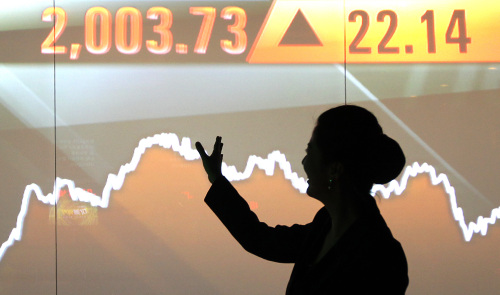 |
(Yonhap News) |
Economists and policymakers supervising the market have opposed lawmakers’ idea of taxing investors more on stock trading and dividends, saying it is likely to do more harm than good.
The ruling Saenuri Party, formerly the Grand National Party, is currently pushing to widen taxable investment income by levying a top rate of 38 percent on those making annual investment returns of more than 30 million won. The 38 percent rate is currently levied on those with annual investment income of more than 40 million won, applicable to about 48,900 people.
Kim Hyeon-wook, senior vice president of SK Research Institute, says the proposed tax reform will discourage trading activities without adding much to tax revenue.
“It is doubtful whether the proposal will in fact bring much gain to the overall tax base. The move is more likely to discourage healthy trading activities,” Kim said.
“Lowering the basket’s ceiling to 30 million won is a significant change from an investor’s perspective,” Kim added.
The debate is a political one. Raising tax for the wealthiest individuals and business entities is a proposal backed by political forces wooing voters ahead of April’s general elections. The Finance Ministry, in charge of budget and market supervision, says tax reforms should be carefully planned.
“Taxing the wealthy is always mulled ahead of an election period, but rushing into the reform isn’t ideal as we pursue consistency and transparency in market regulation,” a Finance Ministry official said.
Finance Minister Bahk Jae-wan last week remained opposed to the tax reform, as it could reduce the amount of investment and financial trading.
“I am cautious about imposing a tax on capital gains from profits from stock investment,” Bahk said during a parliamentary committee meeting on finance. “The international financial market’s volatility is particularly high at this point in time.” Bahk was also against the idea of an increased tax on the super wealthy backed by both the ruling and opposition parties.
“It would be better to find out those who conceal their assets overseas or downsize their revenues and levy taxes on them to implement a fair taxation system,” Bahk said.
The main opposition Democratic United Party, in support of the proposal, said the ratio of the government’s tax revenue to national income decreased from 21 percent to 19.3 percent in the current administration.
The country reported a tax surplus of 6.5 trillion won last year, down 1.3 trillion won from 2010, the ministry said Friday. It collected 270.5 trillion won in tax revenue last year and logged 258.9 trillion won in annual expenditure.
The Lee Myung-bak administration plans to bring revenue equal to expenditure by 2013. It plans to shrink the government deficit to 1 percent of gross domestic product this year from 2 percent in 2011.
By Cynthia J. Kim (
cynthiak@heraldcorp.com)








